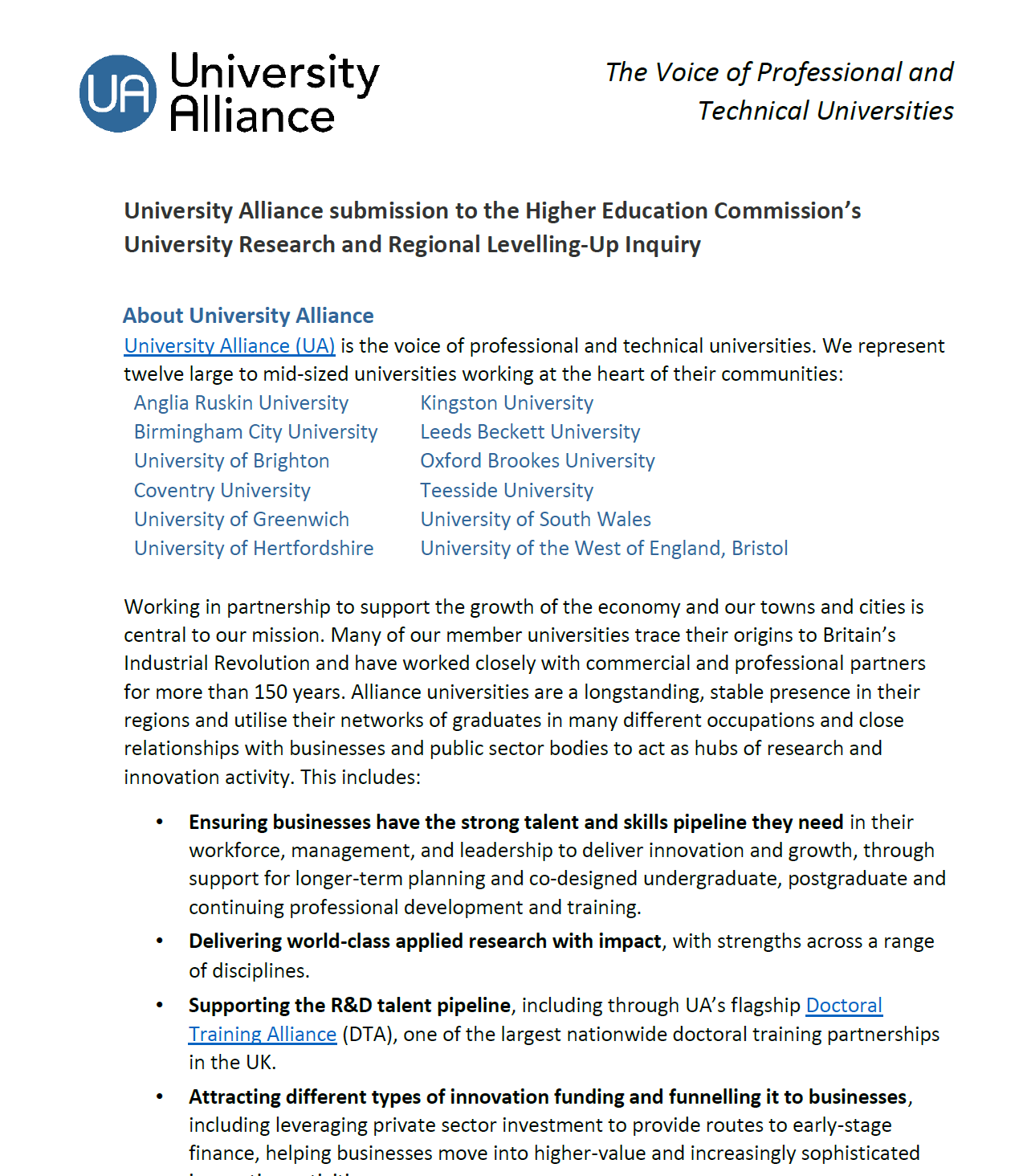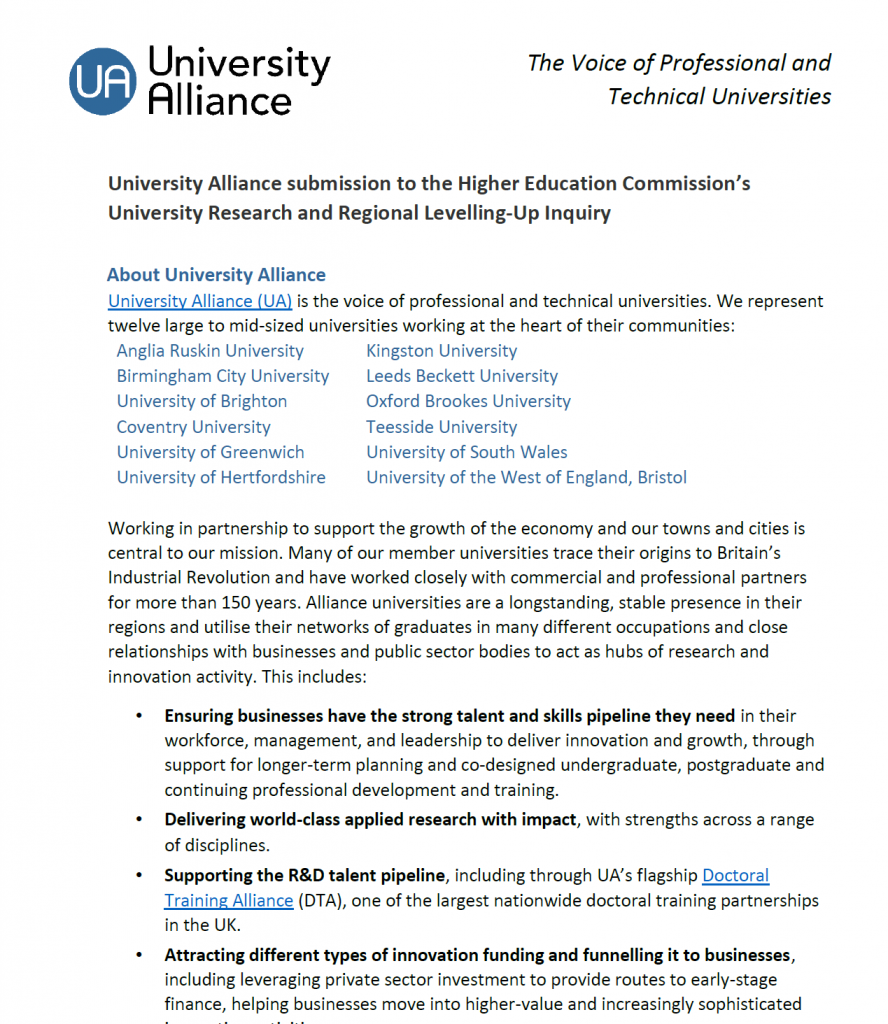Working in partnership to support the growth of the economy and our towns an d cities is central to our mission. Many of our member universities trace their origins to Britain’s Industrial Revolution and have worked closely with commercial and professional partners for more than 150 years. Alliance universities are a longstanding, stable presence in their regions and utilise their networks of graduates in many different occupations and close relationships with businesses and public sector bodies to act as hubs of research and innovation activity. As we look to rebuild we can draw on these long-standing partnerships to support a sustainable recovery that levels-up across our regions.
d cities is central to our mission. Many of our member universities trace their origins to Britain’s Industrial Revolution and have worked closely with commercial and professional partners for more than 150 years. Alliance universities are a longstanding, stable presence in their regions and utilise their networks of graduates in many different occupations and close relationships with businesses and public sector bodies to act as hubs of research and innovation activity. As we look to rebuild we can draw on these long-standing partnerships to support a sustainable recovery that levels-up across our regions.
In this high-level submission, which has been made on behalf of our members, we address three key areas that are being examined by the Commission.
The full submission can be read here, or a summary of our headline asks are below.
Maximising R&D activity and economic impact
- We need a significant cross-government effort to identify synergies, align and sequence the various priorities and investments related to ‘levelling-up’- hopefully to be addressed in the forthcoming Levelling Up White Paper later this year. Universities should be key stakeholders in the engagement leading up to its publication.
- Definitions of place should be flexible, but it is important not to lose sight of measures of success and impact at different ‘levels’ of places as a result. It will be vital that UKRI is systematically gathering intelligence to understand the different needs of different places.
- Excellence exists across the UK. Attempting to grow excellence from scratch will not build relevant capacity and encourage inward investment, whereas Investing in potential and widening existing R&D excellence across the UK will in turn support better place outcomes.
- The UK should shift back to valuing the amount and quality of R&D in inward Foreign Direct Investment to attract the most innovative companies into the UK, which tend to be smaller and riskier, and inject more enterprise into the UK economy.
- Now that the EU-UK Trade and Cooperation Agreement has entered into force, UKRI need to provide clarity around State Aid and how business engages with R&D/public funding.
Collaboration between universities and industry on innovation
- It is vital that research and innovation is integrated as a central theme of the UK Shared Prosperity Fund. In November 2020 UA, along with 70 other businesses and organisations, wrote to the Secretaries of State for BEIS and MHCLG on the important role that leveraging EU Structural Funds with research and innovation funding and co-investment from universities has had in regional innovation programmes and economic development. We are still waiting for clarity on the details of the Fund, and many of the existing projects will soon come to an end.
- The importance of skills to innovation should be recognised and these agendas joined up across government. The success story of degree apprenticeships is an example of the link between skills and innovation, with many Alliance universities utilising them as a gateway to support employers with longer-term workforce planning and innovation activity.
- An important aspect to UKRI’s convening and funding roles will be connecting systems and networks across the UK.
- Businesses need to be better supported to be more demand-led in their interactions with universities and access existing knowledge as well as cutting-edge research. There should be targeted funding opportunities for universities to improve the presentation and accessibility of their knowledge base.
- A key element of improving collaboration on innovation and increasing the absorptive capacity of businesses is through efforts to increase the porosity between academia and industry.
- Support for new agile funding schemes that bring skilled graduates into industry on a faster and shorter-term basis, such as shorter-term Knowledge Transfer Partnerships (KTPs) as well as match-funding opportunities for staff sabbatical schemes should be explored.
- Government needs to take a broader approach to research and innovation, which does not only occur in traditional STEM subjects and is increasingly interdisciplinary. R&D tax credits are not currently permitted for research in the social sciences, humanities, or creative arts; this issue requires urgent reform. Interdisciplinary and social innovation initiatives should also be incentivised and nurtured.
The role of the Advanced Research and Invention Agency (ARIA).
- The ‘radical technological advancements’ outlined in the UK R&D roadmap are needed. However, consideration should be given to ensuring this approach does not remove focus from other important aspects of innovation. To improve UK GDP, we also need to support near-to-market research that makes a real difference to people’s lives.
- ARIA should be part of filling a void in the current UK funding landscape (the so called ‘valley of death’) by improving the translation of adventurous and promising research ideas into concrete applications (i.e., products and practice).
- ARIA will need a distinct purpose and clear mandate but should work closely with other agencies to ensure there are good linkages, no funding mismatches, and the rigour and expertise of existing agencies can be built upon. The utmost clarity about how ARIA will operate alongside UKRI is needed if we are to avoid exacerbating the complexity of navigating the funding landscape




